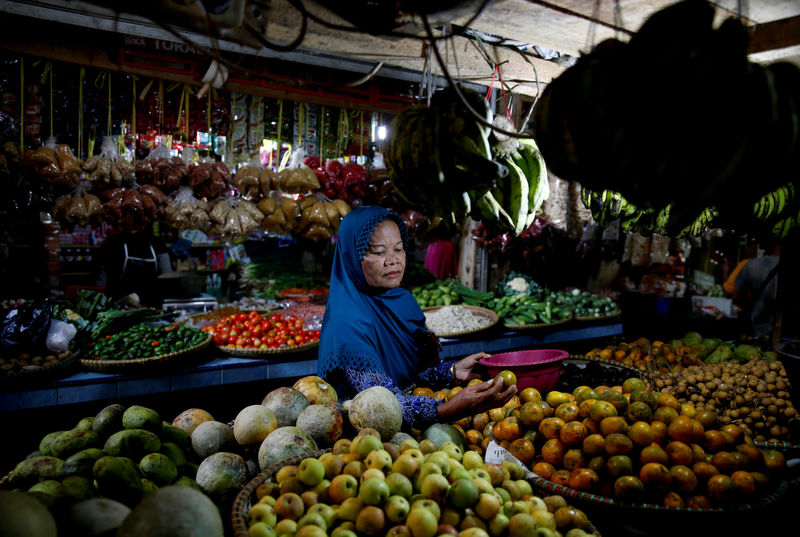By Gayatri Suroyo and Bernadette Christina Munthe
JAKARTA (Reuters) - In trying to solve a major economic headache, large fluctuations in food prices, Indonesia may have unintentionally exacerbated another: domestic demand, the archipelago's main economic engine, which remains stubbornly sluggish.
Consumer sentiment has been hitting record highs this year in the country of 250 million, which economists and retail experts have long touted as a future Mecca for consumer goods.
Yet growth in domestic demand has lingered at rates below 5 percent, underperforming headline growth this year. Officials in the government and at the central bank, which has surprised markets by cutting interest rates twice in recent months, have said they were "baffled" by how weak domestic demand was.
Economists and agricultural experts, however, point to a steady, three-year drop in the average real incomes of Indonesia's 40 million farmers, who account for a third of the labor force. In an interview with Reuters in November, Finance Minister Sri Mulyani Indrawati said the government needed to take a closer look at farmers' incomes, which are 3 percent lower in real terms than they were three years ago.
"We really need to watch what's behind these statistics," the minister said.
Farming experts say falling rural incomes are partly a side effect of recent government policies to stabilize food prices, which account for 35 percent of the inflation basket.
RICE FLOOR PRICE
In 2015, the government set its floor price for unhusked rice of 3,700 rupiah per kg and has not changed it since, while consumer prices have risen 15 percent.
That helped stabilize food inflation below 1 percent. But production costs, which include machinery maintenance, pesticides and fertilizers, have risen to 4,400 per kg of rice this year from 4,199 per kg in 2016, according to Dwi Andreas Santosa, a professor at Bogor Agricultural University.
In theory, the floor price should protect farmers from sharp falls, while allowing them freedom to negotiate upwards.
In practice, however, most rice is sold at or close to the floor price, because farmers rely on short-term loans to cover their production costs. The loans usually need to be repaid shortly after the harvest, leaving them little leeway.
That means at harvest time, a large supply of rice hits the market over a short period of time, weighing down prices.
"Farming machinery from the government doesn't work, fertilizer is expensive and we're being played around during harvest, too," said Wignyo Sunarno, a 62-year-old farmer in Karanganyar, Central Java, referring to having to quickly repay loans often taken from rice traders rather than banks.
Finance Minister Indrawati said incomes will only improve if productivity picks up and the government is trying to help by investing in irrigation systems. Data from Indonesia's Planning Ministry shows that Widodo's administration aims to build 1 million hectares of new irrigation networks in 2015-2019.
That could solve some of the problems that face farmers like 57-year-old Bibit in Klaten, in central Java province. Because he depends on rain, he cannot grow rice in the dry season, when prices are higher.
"I haven't planted rice because rain is still rare," said Bibit, who like many Indonesians goes by one name. "If my income came only from farming, it would not be enough," he said, adding that his pension as an air force retiree fills the gap.
NO SMARTPHONES
Things might get even worse.
In August, the government introduced a cap on retail prices for some types of rice, aiming to trim the margins traders and middlemen get from rice trading.
But farming experts warn traders are exacting lower prices from farmers, because living from one crop to another puts them in a poor bargaining position.
"You shouldn't reduce farmers income to provide good prices for consumers. This will only lead to an increase in the poverty rate," said Santosa at the Bogor Agricultural University.
Lower farming incomes are a significant drag on consumption as farmers, unlike urban workers, are more likely to spend than save as they aspire to catch up with city lifestyles.
Entin, a farmer in Majalaya, in the province of West Java, said the profit from her plot of land was falling, forcing her husband to leave the area to find work. She also had to fend off requests from her three children to buy smartphones she could not afford.

"Being a farmer is giving me headaches," she said, sitting in the living room of the house she shares with her husband's parents and siblings.